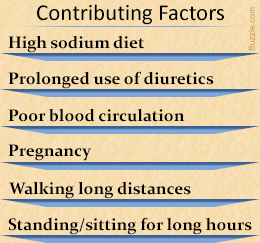Swelling in the feet can be caused by a wide range of reasons. It can occur as a result of walking long distances, or standing/sitting for long hours. It can also occur as a side effect of certain medical conditions.

Swelling of the feet is a result of a buildup of fluids. When fluid is retained in the legs, ankles, and/or feet, it is called peripheral edema. Feet and/or ankles can swell up either due to conditions involving the local extremities (such as injuries and infections), or because of conditions that affect the entire body.
Possible Causes
Swollen feet causes are varied, and could be mild or serious in nature. Here are some of the common contributing factors for swelling of the feet.
Medication
Prolonged use of certain medicines can cause the feet to swell. Intake of calcium channel blockers (calcium antagonists), high-estrogen birth control pills, non steroidal anti-inflammatory drugs (NSAIDs), certain antidepressants, drugs that open blood vessels (vasodilators), and certain diabetes medications called thiazolidinediones can cause fluid retention in the lower extremities.
Infections
As mentioned earlier, infections can also cause feet to swell up. People suffering from nerve problems due to diabetes or any other serious health conditions are more prone to infections in the lower extremities, which can result in foot pain and swelling. A person having diabetes should monitor his feet regularly for blisters and sores and if they occur, consult a doctor immediately.
Pregnancy
Swollen feet and ankles are quite common during pregnancy. While some experience swelling of the feet since the second trimester itself, some may get affected by edema during the last month of pregnancy. During pregnancy, the uterus puts a lot of pressure on the inferior vena cava, thereby causing blood to pool. The pressure buildup causes fluid from tissues to accumulate in the feet.
Preeclampsia
Preeclampsia is a condition in which the constriction of blood vessels causes the blood pressure to rise. This is a dangerous condition because constricted blood vessels allow less blood flow to the uterus, thereby not providing sufficient oxygen and nutrition to the growing fetus. If the blood pressure is not lowered quickly, the life of both mother and the fetus is at risk. In most cases, immediate delivery is recommended. One has to check if the swelling is only restricted to the ankles and feet or does it extend to the face and hands as well. If it does extend to other parts of the body, immediate medical care is required.
Diseases
There are several diseases in which swelling of the feet is observed. For example, in
congestive heart failure, when the heart loses its ability to pump blood effectively, the rate of blood circulation is adversely affected. When it becomes difficult for the blood in the feet to move back to the heart, it can back up in your feet, legs and ankles, causing edema (swelling).
Another cause is
cirrhosis, which causes scarring of the liver. When liver function is compromised, it can cause fluid accumulation in the legs and abdominal cavity. Kidney diseases make the kidneys incapable of eliminating enough fluid and sodium from your blood, and can result in edema usually in the legs and around the eyes.
Kidney failure also leads to edema.
Vein damage in the legs, renders them incapable of pumping enough blood back to the heart. This remaining blood, pressurizes the veins and causes swelling.
The lymphatic system, which helps clear excess fluid from tissues, may be damaged due to
lymphedema. A blockage in the lymphatic system causes interstitial fluid buildup.
Arthritis is another health condition, in which the person suffers from pain and swelling in the feet. In this condition, the joints of the body get affected and fluid retention in the joints causes swelling.
As you have seen, the causes of swollen feet are many. In order to detect causes of swollen feet in your case, you need to consult a health care provider. In the meantime, here are some steps you can take to prevent swollen feet:
► Include exercise in your daily routine. Mostly leg exercises increase circulation and can eliminate excess fluid from your feet.
► Another swollen feet prevention measure is to wear support stockings in the morning, to improve circulation. They also reduce the fluid buildup that usually occurs throughout the day.
► Don't spend several hours sitting or standing in one place. Every now and then, stop to stretch, or better yet, walk around.
► Excess weight can hamper proper circulation, so try to maintain healthy weight.
► Reduce the quantity of salt in your food. This will lower the risk of hypertension and edema.
Swollen feet or ankles are not a cause for concern until they are accompanied by some other symptoms. Hence, if you have swollen feet because you have been standing or sitting for long periods, it will resolve on its own. However, if you experience persistent swelling of the feet or ankles, consult a doctor immediately.
Disclaimer: This Buzzle article is for informative purposes only, and should not be used as a replacement for expert medical advice.


 Swelling of the feet is a result of a buildup of fluids. When fluid is retained in the legs, ankles, and/or feet, it is called peripheral edema. Feet and/or ankles can swell up either due to conditions involving the local extremities (such as injuries and infections), or because of conditions that affect the entire body.
Swelling of the feet is a result of a buildup of fluids. When fluid is retained in the legs, ankles, and/or feet, it is called peripheral edema. Feet and/or ankles can swell up either due to conditions involving the local extremities (such as injuries and infections), or because of conditions that affect the entire body.